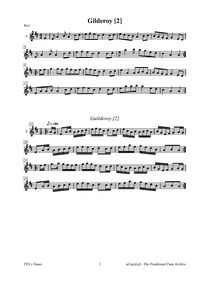Template:Pagina principale/Vetrina: Difference between revisions
No edit summary |
No edit summary |
||
| Line 1: | Line 1: | ||
{{SheetMusic | {{SheetMusic | ||
|f_track= | |f_track=Gilderoy.mp3 | ||
|f_pdf= | |f_pdf=Guilderoy.pdf | ||
|f_artwork= | |f_artwork=Jacobite_broadside_-_Gilder_Roy_in_his_genuine_Highland_Garb.jpg | ||
|f_tune_name= | |f_tune_name=Guilderoy | ||
|f_track_title= | |f_track_title=Gilderoy_(2) | ||
|f_section=abc | |f_section=abc | ||
|f_played_by=[https://soundcloud.com/ | |f_played_by=[https://soundcloud.com/robmackillop Rob MacKillop] | ||
|f_notes= | |f_notes= Historically, Gilleruadh was the nickname of a famous Scottish highwayman named Patrick McGregor who was captured and executed in 1636. | ||
|f_source=[https://soundcloud.com/robmackillop/21gilderoy Soundcloud] | |||
|f_source=[https://soundcloud.com/ | |||
|f_pix=420 | |f_pix=420 | ||
|f_picpix=200 | |f_picpix=200 | ||
|f_article=[[ | |f_article=[[Gilderoy_(2) | '''Guilderoy''']] | ||
The Scots national poet, Robert Burns, set one of his early lyrics to it, called "From Thee, Eliza." Macfarlane, in his 'Studies' claimed this tune, among others, was a Gaelic melody, and postulated that an analysis of airs for alteration of musical accent and the introduction of what he termed 'slurs' could detect which tunes had been originally Gaelic but were altered to fit English lyrics. | |||
Bayard (1981), Cazden (et al, 1982) and others have long determined that 'Guilderoy', in both vocal and instrumental settings, stems from the protean 'Lazarus' air (see also "Bonaparte's Retreat"), and numbers among one of the half-dozen or so most extensively used melodies in the entire English-speaking folk tune repertory (see JWFSS, I, 142). | |||
Elaborates Bayard: "This melody is one of several which provide some index of the extent to which the local tradition is independent of commerical printed collections of fiddle tunes. Bub Yaugher's (Pennsylvania-collected) variant represents the version in which 'Guilderoy' seems always to be known in western Pennsylvania—distinctive in melodic outling, and invariable played in the mixolydian mode. | |||
As might be expected the tune is not always known under this name, which is, however, the one most often attached to it. The mixolydian version of 'Gilderoy' is undoubtedly Irish: the editor has repeatedly heard it performed by Irish fiddlers in Massachusetts, and they have always played this version, in variants rather close to the Pennsylvania sets. | |||
The printed collections, on the other hand, nearly always give the tune in dorian or aeolian tonality, which corresponds to the tonality of its well known (English and) Scottish versions. | |||
}} | }} | ||
Revision as of 18:22, 15 October 2023

Played by: Rob MacKillop
Source: Soundcloud
Image: Historically, Gilleruadh was the nickname of a famous Scottish highwayman named Patrick McGregor who was captured and executed in 1636.

The Scots national poet, Robert Burns, set one of his early lyrics to it, called "From Thee, Eliza." Macfarlane, in his 'Studies' claimed this tune, among others, was a Gaelic melody, and postulated that an analysis of airs for alteration of musical accent and the introduction of what he termed 'slurs' could detect which tunes had been originally Gaelic but were altered to fit English lyrics.
Bayard (1981), Cazden (et al, 1982) and others have long determined that 'Guilderoy', in both vocal and instrumental settings, stems from the protean 'Lazarus' air (see also "Bonaparte's Retreat"), and numbers among one of the half-dozen or so most extensively used melodies in the entire English-speaking folk tune repertory (see JWFSS, I, 142).
Elaborates Bayard: "This melody is one of several which provide some index of the extent to which the local tradition is independent of commerical printed collections of fiddle tunes. Bub Yaugher's (Pennsylvania-collected) variant represents the version in which 'Guilderoy' seems always to be known in western Pennsylvania—distinctive in melodic outling, and invariable played in the mixolydian mode.
As might be expected the tune is not always known under this name, which is, however, the one most often attached to it. The mixolydian version of 'Gilderoy' is undoubtedly Irish: the editor has repeatedly heard it performed by Irish fiddlers in Massachusetts, and they have always played this version, in variants rather close to the Pennsylvania sets.
The printed collections, on the other hand, nearly always give the tune in dorian or aeolian tonality, which corresponds to the tonality of its well known (English and) Scottish versions.
...more at: Guilderoy - full Score(s) and Annotations
X:1 T:Gilderoy [2] M:4/4 L:1/8 R:Reel K:Amix V:1 clef=treble name="1." [V:1] F2|EA2B A2 cd|efec d2 cd|edcB A2 Bc|BAGF G2 ED| EA2B A2cd|efec d2 cd|ea2b aged|c2A2A2:| |:ef|g2 gf gfef|gfec d2 cd|e2A2 ABcA|BAGF G2 ED| EAAB A2 cd|efec d2 cd|eaab a2 ed|c2A2A2:||
